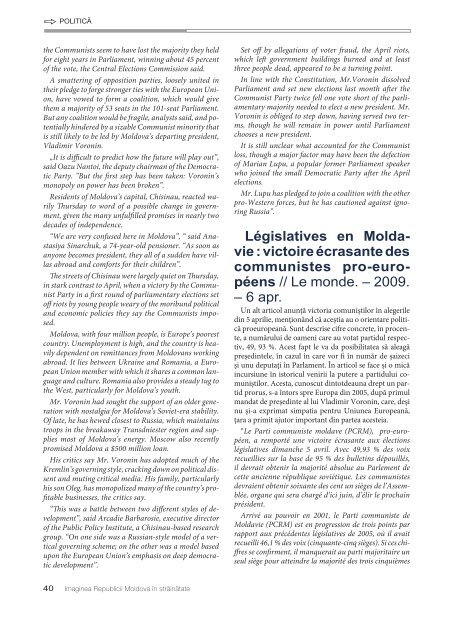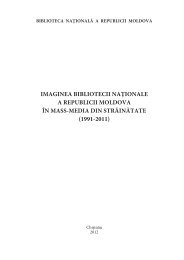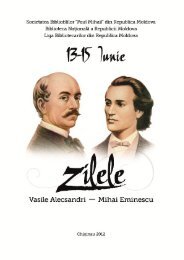POLITICĂthe Communists seem to have lost the majority they heldfor eight years in Parliament, winning about 45 percentof the vote, the Central Elections Commission said.A smattering of opposition parties, loosely united intheir pledge to forge stronger ties with the European Union,have vowed to form a coalition, which would givethem a majority of 53 seats in the 101-seat Parliament.But any coalition would be fragile, analysts said, and potentiallyhindered by a sizable Communist minority thatis still likely to be led by Moldova’s departing president,Vladimir Voronin.„It is difficult to predict how the future will play out”,said Oazu Nantoi, the deputy chairman of the DemocraticParty. ”But the first step has been taken: Voronin’smonopoly on power has been broken”.Residents of Moldova’s capital, Chisinau, reacted warilyThursday to word of a possible change in government,given the many unfulfilled promises in nearly twodecades of independence.“We are very confused here in Moldova”, “ said AnastasiyaSinarchuk, a 74-year-old pensioner. “As soon asanyone becomes president, they all of a sudden have villasabroad and comforts for their children”.The streets of Chisinau were largely quiet on Thursday,in stark contrast to April, when a victory by the CommunistParty in a first round of parliamentary elections setoff riots by young people weary of the moribund politicaland economic policies they say the Communists imposed.Moldova, with four million people, is Europe’s poorestcountry. Unemployment is high, and the country is heavilydependent on remittances from Moldovans workingabroad. It lies between Ukraine and Romania, a EuropeanUnion member with which it shares a common languageand culture. Romania also provides a steady tug tothe West, particularly for Moldova’s youth.Mr. Voronin had sought the support of an older generationwith nostalgia for Moldova’s Soviet-era stability.Of late, he has hewed closest to Russia, which maintainstroops in the breakaway Transdniester region and suppliesmost of Moldova’s energy. Moscow also recentlypromised Moldova a $500 million loan.His critics say Mr. Voronin has adopted much of theKremlin’s governing style, cracking down on political dissentand muting critical media. His family, particularlyhis son Oleg, has monopolized many of the country’s profitablebusinesses, the critics say.“This was a battle between two different styles of development”,said Arcadie Barbarosie, executive directorof the Public Policy Institute, a Chisinau-based researchgroup. “On one side was a Russian-style model of a verticalgoverning scheme; on the other was a model basedupon the European Union’s emphasis on deep democraticdevelopment”.Set off by allegations of voter fraud, the April riots,which left government buildings burned and at leastthree people dead, appeared to be a turning point.In line with the Constitution, Mr.Voronin dissolvedParliament and set new elections last month after theCommunist Party twice fell one vote short of the parliamentarymajority needed to elect a new president. Mr.Voronin is obliged to step down, having served two terms,though he will remain in power until Parliamentchooses a new president.It is still unclear what accounted for the Communistloss, though a major factor may have been the defectionof Marian Lupu, a popular former Parliament speakerwho joined the small Democratic Party after the Aprilelections.Mr. Lupu has pledged to join a coalition with the otherpro-Western forces, but he has cautioned against ignoringRussia”.Législatives en Moldavie: victoire écrasante descommunistes pro-européens// Le monde. – 2009.– 6 apr.Un alt articol anunţă victoria comuniştilor în alegeriledin 5 aprilie, menţionând că aceştia au o orientare politicăproeuropeană. Sunt descrise cifre concrete, în procente,a numărului de oameni care au votat partidul respectiv,49, 93 %. Acest fapt le va da posibilitatea să aleagăpreşedintele, în cazul în care vor fi în număr de şaizecişi unu deputaţi în Parlament. În articol se face şi o micăincursiune în istoricul venirii la putere a partidului comuniştilor.Acesta, cunoscut dintotdeauna drept un partidprorus, s-a întors spre Europa din 2005, după primulmandat de preşedinte al lui Vladimir Voronin, care, deşinu şi-a exprimat simpatia pentru Uniunea Europeană,ţara a primit ajutor important din partea acesteia.“Le Parti communiste moldave (PCRM), pro-européen,a remporté une victoire écrasante aux électionslégislatives dimanche 5 avril. Avec 49,93 % des voixrecueillies sur la base de 95 % des bulletins dépouillés,il devrait obtenir la majorité absolue au Parlement decette ancienne république soviétique. Les communistesdevraient obtenir soixante des cent un sièges de l’Assemblée,organe qui sera chargé d’ici juin, d’élir le prochainprésident.Arrivé au pouvoir en 2001, le Parti communiste deMoldavie (PCRM) est en progression de trois points parrapport aux précédentes législatives de 2005, où il avaitrecueilli 46,1 % des voix (cinquante-cinq sièges). Si ces chiffresse confirment, il manquerait au parti majoritaire unseul siège pour atteindre la majorité des trois cinquièmes40 Imaginea Republicii Moldova în străinătate
POLITICĂ(soixante et un députés) requise pour élire le nouveau président.Ce vote doit avoir lieu avant le 8 juin.A la frontière de l’EuropeLe président sortant, Vladimir Voronine, a déjà effectuédeux mandats et ne peut donc pas se présenter à nouveaupour cette fonction. Lors de la campagne, il a mis enavant son bilan économique positif, bien que le pays resteà ce jour un des plus pauvres d’Europe. Dans une interviewau “Courrier des Balkans”, cet ancien boulanger,explique qu’il va cependant rester à la tête du PCRM. Ildevrait donc continuer à peser sur la politique du pays.Longtemps réputé pro-russe, le PCRM a effectué untournant vers l’Europe en 2005, après le premier mandatde Vladimir Voronine. Sans pour autant demanderl’adhésion à l’UE, comme son voisin roumain, le paysreçoit des aides importantes de sa part.L’approfondissement des relations avec l’Europe étaitd’ailleurs un des enjeux du bon déroulement de ce scrutin.Les négociations d’un nouvel accord d’associationavaient été repoussés après le scrutin en raison demanquements aux règles démocratiques, comme des pressionssur les médias et des poursuites en justice contre lespartis d’opposition. L’annonce de l’Organisation pour lasécurité et la coopération en Europe (OSCE), qui a estiméque ces élections étaient dans l’ensemble conformesaux normes internationales, devrait aider la Moldaviedans son rapprochement avec l’UE.Les trois plus importates formations de droite du paysarrivent loin derrière le Parti communiste. Le Parti libéral(12,88 %), le Parti libéral-démocrate (12,24%) etNotre Moldavie (9,87 %), ont franchi le seuil des 6 %pour entrer à l’Assemblée. Le taux de participation a étéde 59,52 %.”Moldavie : le présidentdénonce une tentative decoup d’Etat // Le monde. –2009. – 7 apr.Le monde pune la dispoziţia cititorilor un materialprivitor la evenimentele ce au urmat după eşuarea alegerilor,“lovitura de stat”. Este analizată situaţia generală,atmosfera, starea de lucruri din ţară la acea dată,6 aprilie, după ce au fost aduse la cunoştinţa publiculuirezultatele alegerilor, în care au câştigat comuniştii. Înarticol este menţionată atmosfera destul de încordatădupă manifestările violente ca reacţie a tinerilor la victoriapartidului nedorit.“La situation restait très tendue dans la soirée dumardi 7 avril, en Moldavie, après une journée de violentesmanifestations contre la victoire des communistesaux élections législatives de dimanche. Des milliers dejeunes manifestants ont pris d’assaut dans l’après-midila présidence et le Parlement dans le centre de Chisinau,la capitale du pays, et une femme a trouvé la mort dansle Parlement, selon la télévision nationale. Cette informationn’a pas pu être imm édiatement confirmée.Cité par “Le Courrier des Balkans”, l’écrivain et journalisteNicolae Dabija, proche de l’opposition, dit voir dansces événements un avant-goût de révolution : “J’étais devantle Parlement quand un groupe de jeunes a pris d’assautle bâtiment, brisé les vitres et jeté des meubles parla fenêtre. En contrebas, les manifestants ont mis le feu àces meubles. Il y a quelque chose de 1789 dans ces événements.On n’est pas loin d’une révolution de velours.”Malgré l’utilisation de grenades lacrymogènes et de canonsà eau par la police, de violents heurts se sont produitsavec les forces de l’ordre, faisant des dizaines de blessés.“Plus de 30 blessés ont été amenés chez nous. Il y a des policierset des jeunes parmi les manifestants. Ils souffrent dedivers traumatismes, il y a des blessés graves”, a déclaré lemédecin en chef de l’hôpital des urgences de Chisinau.Devant cette flambée de violence, le président communistesortant, Vladimir Voronine, a affirmé que la Moldaviedéfendrait “fermement l’intégrité de l’Etat” face àdes “fascistes ivres de colère qui tentent de commettre uncoup d’Etat”. Le successeur de M. Voronine doit être élupar le prochain Parlement entre le 8 avril et le 8 juin.“Nous restons dans la rue”Les partis de l’opposition libérale, qui dénoncent desirrégularités lors de ces élections législatives, ont appelé àpoursuivre les manifestations tant que leurs exigences neseraient pas satisfaites : ils demandent un nouveau comptagedes voix et l’annulation du scrutin si les fraudessont avérées. “Nous n’avons pas eu de réponse des autoritésà nos exigences. Nous continuons d’attendre etnous restons dans la rue”, a déclaré le président du Partilibéral-démocrate, Vlad Filat, démentant qu’un accordait été trouvé avec le pouvoir.Le Parti communiste moldave (PCM), pro-européen,a remporté 50 % des suffrages aux élections législatives,loin devant le Parti libéral et le Parti libéral-démocrate.L’Organisation pour la sécurité et la coopération en Europe(OSCE) a jugé ces élections dans l’ensemble conformesaux normes internationales.L’Union européenne, par la voix de son chef de ladiplomatie, Javier Solana, s’est dit “très inquiète” de lasituation à Chisinau et a appelé “toutes les parties à nepas céder à la violence et à la provocation”. Le présidentrusse Dmitri Medvedev réclame, lui, un “règlement pacifique”de la crise dans le pays.Imaginea Republicii Moldova în străinătate 41
- Page 1 and 2: ISSN 1857-1565BIBLIOTECA NAŢIONAL
- Page 4 and 5: Grigore vieru - martir al neamului
- Page 6 and 7: Grigore vieru - martir al neamului
- Page 8 and 9: Grigore vieru - martir al neamului
- Page 10 and 11: Grigore vieru - martir al neamului
- Page 12 and 13: Grigore vieru - martir al neamului
- Page 14 and 15: Grigore vieru - martir al neamului
- Page 16 and 17: Grigore vieru - martir al neamului
- Page 18 and 19: Grigore vieru - martir al neamului
- Page 20 and 21: Grigore vieru - martir al neamului
- Page 22 and 23: Grigore vieru - martir al neamului
- Page 24 and 25: Grigore vieru - martir al neamului
- Page 26 and 27: CULTURĂ. CIVILIZAŢIEdlung oftmals
- Page 29 and 30: BIBLIOTECONOMIEственно, та
- Page 31 and 32: BIBLIOTECONOMIEOsoianu, Vera. Bibli
- Page 33 and 34: BIBLIOTECONOMIEOsoianu, Vera. Compo
- Page 35 and 36: POLITICĂGabanyi, Anneli Ute. Moldo
- Page 37 and 38: POLITICĂangesichts dieser Umfragen
- Page 39: POLITICĂGoanec, Mathilde. Moldavie
- Page 43 and 44: POLITICĂfamiliile lor, aceştia su
- Page 45 and 46: POLITICĂLa Moldavie recompteses bu
- Page 47 and 48: POLITICĂtes aujourd’hui pour des
- Page 49 and 50: POLITICĂBarthet, Elise. Cinqquesti
- Page 51 and 52: POLITICĂMoldavia, 193 personearres
- Page 53 and 54: medicinăСалита, Х. Запи
- Page 55 and 56: medicinăчто всегда был
- Page 57 and 58: PICTURĂmai bună conştientizare a
- Page 59 and 60: PICTURĂcipantă, fiind selecţiona
- Page 61 and 62: PICTURĂIoan Grecu - artist plastic
- Page 63 and 64: PICTURĂ2002 - Sculptura la îngem
- Page 65 and 66: PICTURĂFloarea dimineţii, s. Hru
- Page 67 and 68: PICTURĂtru Copii din Orhei, Moldov
- Page 69 and 70: PICTURÔLumina din picturile lui
- Page 71 and 72: PICTURĂION SEVERIN, un artist basa
- Page 73 and 74: MUZICĂALEXA (Olga Fesenco) a adus
- Page 75 and 76: MUZICĂmai spune că s-a simţit fo
- Page 77 and 78: MUZICĂProfesorul lui Ilian Gârne
- Page 79 and 80: MUZICĂprecizând că cei şase pre
- Page 81 and 82: MUZICĂŞTEFĂNEL ROŞCOVANTânăru
- Page 83 and 84: SPORTAi noştri pe EverestUn concet
- Page 85 and 86: SPORTsemnat pe Ion Dosca al patrule
- Page 87 and 88: SPORTDupă faza preliminară din 7
- Page 89 and 90: LINGVISTICĂ• Membru al Comitetul
- Page 91 and 92:
LINGVISTICĂinterculturale ULIM, re
- Page 93 and 94:
Ştiinţa literaturiilum este probl
- Page 95 and 96:
Ştiinţa literaturiiantitotalitari
- Page 97 and 98:
Ştiinţa literaturiirepede morală
- Page 99 and 100:
literatura artisticăCiocan, Iulian
- Page 101 and 102:
literatura artisticăv stud a zmate
- Page 103 and 104:
literatura artisticăDruŢă, Boris
- Page 105 and 106:
literatura artisticăpoporului bibl
- Page 107 and 108:
literatura artisticăTRAIANUS. Inbo
- Page 109 and 110:
literatura artisticăTRAIANUS. Reg
- Page 111 and 112:
ArheologieТези Мiжнарод
- Page 113 and 114:
IstoriePlugaru, Ştefan. Episcopia
- Page 115 and 116:
Istorietarea ei de reşedinţele ep
- Page 117 and 118:
BIBLIOGRAFIE1. Alloquor: Studia Hum
- Page 119 and 120:
BIBLIOGRAFIEжитностi в до
















